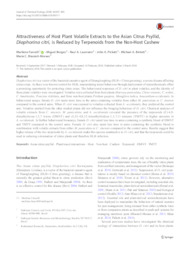Attractiveness of host plant volatile extracts to the asian citrus psyllid, Diaphorina citri, is reduced by terpenoids from the non-host cashew.
Attractiveness of host plant volatile extracts to the asian citrus psyllid, Diaphorina citri, is reduced by terpenoids from the non-host cashew.
Author(s): FANCELLI, M.; BORGES, M.; LAUMANN, R. A.; PICKETT, J. A.; BIRKETT, M. A.; BLASSIOLI-MORAES, M. C.
Summary: Diaphorina citri is a vector of the bacterial causative agent of Huanglongbing (HLB?=?Citrus greening), a severe disease affecting citrus crops. As there is no known control for HLB, manipulating insect behaviour through deployment of semiochemicals offers a promising opportunity for protecting citrus crops. The behavioural responses of D. citri to plant volatiles, and the identity of these plant volatiles were investigated. Volatiles were collected from host plants Murraya paniculata, Citrus sinensis, C. reshni, C. limettioides, Poncirus trifoliata, and from non-host plants Psidium guajava, Mangifera indica, Anacardium occidentale. In behavioural assays, female D. citri spent more time in the arms containing volatiles from either M. paniculata or C. sinensis compared to the control arms. When D. citri was exposed to volatiles collected from A. occidentale, they preferred the control arm. Volatiles emitted from the other studied plants did not influence the foraging behaviour of D. citri. Chemical analyses of volatile extracts from C. sinensis, M. paniculata, and A. occidentale revealed the presence of the terpenoids (E)-4,8-dimethylnona-1,3,7-triene (DMNT) and (E,E)-4,8,12-trimethyltrideca-1,3,7,11-tetraene (TMTT) in higher amounts in A. occidentale. In further behavioural bioassays, female D. citri spent less time in arms containing a synthetic blend of DMNT and TMTT compared to the control arms. Female D. citri also spent less time in arms containing the synthetic blend in combination with volatile extracts from either M. paniculata or C. sinensis compared to the control arms. Results suggest that higher release of the two terpenoids by A. occidentale make this species unattractive to D. citri, and that the terpenoids could be used in reducing colonisation of citrus plants and therefore HLB infection.
Publication year: 2018
Types of publication: Journal article
Unit: Embrapa Cassava & Fruits
Keywords: Asian citrus psyllid, Cashew fruit, Citrus, DMNT, Hosts, Non-host, Plant insect interactions, TMTT, Terpenoids
Observation
Some of Embrapa's publications are published as ePub files. To read them, use or download one of the following free software options to your computer or mobile device. Android: Google Play Books; IOS: iBooks; Windows and Linux: Calibre.
Access other publications
Access the Agricultural Research Database (BDPA) to consult Embrapa's full library collection and records.
Visit Embrapa Bookstore to purchase books and other publications sold by Embrapa.

